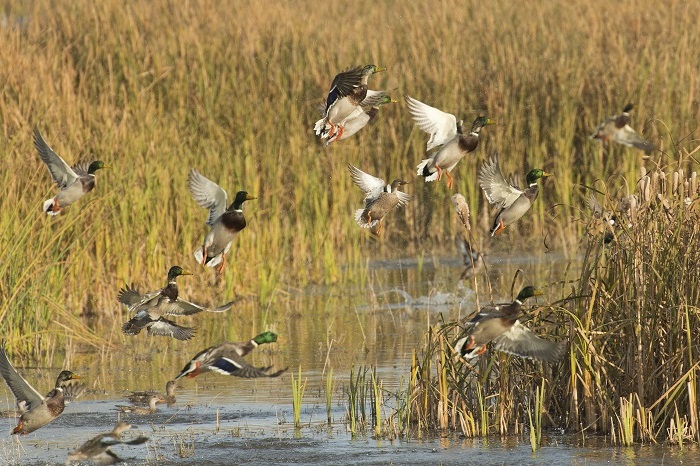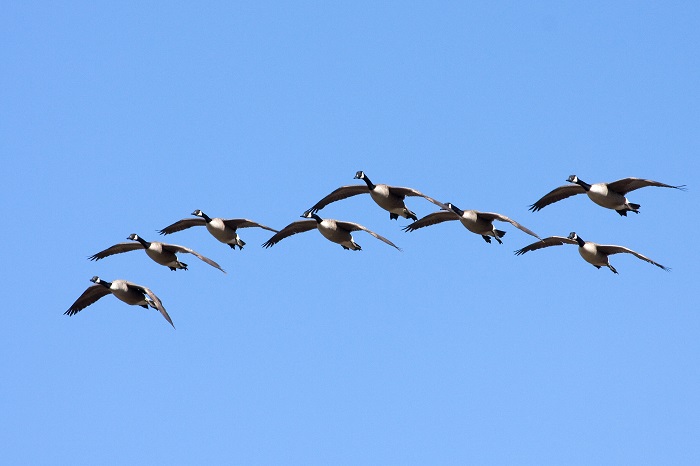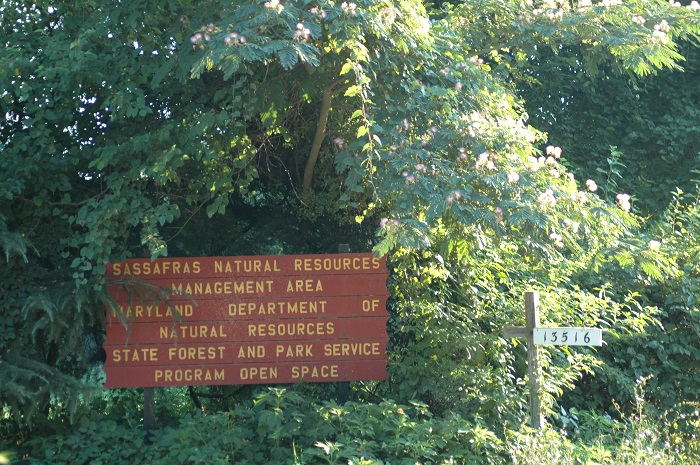
Waterfowling in Kent County, Maryland
There’s a thrill when you see it—so many geese sweeping down on a marsh, their calls can be deafening, and their wings eclipse the sky. The expanses of river, marsh, and fields that make up the bulk of Kent County are right along the Atlantic flyway, a migratory funnel that siphons 29 species of waterfowl, including geese, ducks, and swans, by the thousands.
These birds fly up to 1,600 miles from their Arctic breeding grounds to Maryland, where they spend the relatively mild winter feeding on underwater grasses, clams, mussels and fields of corn.
A Tradition Four Hundred Years in the Making
In 1666, an Englishman named George Alsop wrote about his experience in Maryland. The waterfowl were so abundant, he wrote, “There was such an incessant clattering made with their wings on the water where they rose, and such a noise of those flying higher up that it was as if we were all the time surrounded by a whirlwind.”
Now, nearly four centuries later, sportsmen and women throughout the Mid-Atlantic region flock to Kent County to continue the tradition of hunting since this area provides not only ample game, open fields, forests and marshes to hunt, but local expertise to guide the hunters to the prime hunting grounds.
Wayne Gatling is one of the many professional guides in Kent County. “I was born and raised in Rock Hall,” says the outdoorsman. “I started guiding when I was 19; this is what I’ve done my entire life.”
[gallery link="none" size="full" columns="1" ids="9674"]
His regular clients come from all over the east coast. Gatling provides the full experience in hunting ducks and geese, from grooming the cornfields to placing the decoys to calling in the birds and providing the Labradors to retrieve the game. “We even have a picking operation in town,” he says. “They pick them and when they’re done, it looks like a Christmas turkey.” So his clients can take their harvest home, fit for a banquet.
Guides are perhaps some of the best and most dedicated conservationists. “We manage our properties so they’re not overshot,” Gatling explains.
Sport and Conservation
Kate Livie, an author and historian from Chestertown, wrote about the value of the sport of hunting to the conservation of natural resources in an article published by the Bay Journal News Service.
“This prominent reaping of waterfowl is not a violation of the environment at all,” she wrote. “These hunters, the licenses they buy for the privilege of harvesting waterfowl and the preservation organizations they support, represent, arguably, one of the best-managed, best-funded and oldest conservation programs in North America.”

Livie noted that prior to the strict 1918 enforcement laws, “market hunters” would use huge, cannon-like shotguns to slaughter waterfowl by the thousands to provide feathers to decorate ladies’ hats or to provide meat for diners at fancy restaurants.
“Since then, the harvest of Chesapeake waterfowl has been closely managed by strict bag limits and restrictions on hunting tools, gear, blinds, and boats,” Livie wrote. “Some species, like swans, in Maryland have been removed from harvest altogether. Others, like Canada geese, have had long-term protective moratoriums over the years, but all are closely supervised by federal and state agencies that monitor the bird populations and dictate the number that can be taken annually.”

The strict management of these precious natural resources has worked well.
“Experts from the Maryland Department of Natural Resources and the U.S. Fish and Wildlife Service counted more ducks, geese and swans in their aerial surveys (in 2017) than in 2016, resulting in a nearly 23 percent increase in the results of the annual survey,” reported by Stephanie Smith, the web content manager for the Chesapeake Bay Program. This article was published in the Bay Journal.
Finding the Perfect Spot
“Marshes, mudflats, and shorelines—which offer plenty of fish, underwater grasses and aquatic invertebrates to feast on—make the Bay region a perfect winter stopover for migrating waterfowl,” Smith added.

Hunting in Kent County isn’t just about ducks and geese. There are plenty of opportunities to pursue upland game birds, like doves, quail, and turkeys, not to mention deer. The Millington Wildlife Management Area is open for hunting during all established seasons.
This 4,000-acre parcel is located in eastern Kent County and consists of hardwood forests with some pine stands, various types of wetlands, fallow managed fields, meadow plantings, and open agricultural fields. Once the home of the Lenni Lenape Native Americans, Millington fulfills several roles in managing natural resources, from protecting several endangered species of plants and animals to providing hunting and outdoor recreation to demonstrating wildlife management techniques. Migratory Canada goose and spring turkey hunters must obtain a free Central Region Public Hunting Permit and reservation through the department's Gwynnbrook office (410-356-9272).
The Maryland Park Service oversees the Sassafras Natural Resources Management Area, located along the scenic banks of the Sassafras River and Turner's Creek. Sassafras NRMA provides prime opportunities for hunting White-Tailed Deer during most of the legal hunting seasons. Small game species abound during a limited season. Waterfowl hunting from blinds is available via a lottery. Applications and information are available in the Maryland Hunting Guide or by calling the park office at 410-820-1668.

Another of Kent County’s treasured hunting grounds sits on an island at the mouth of the Chester River. Eastern Neck National Wildlife Refuge boasts 2,285 acres of brackish marsh, natural ponds, upland forest and grasslands where you can hunt for deer in the fall. Deer hunt brochures and applications are available mid-summer. Please contact the refuge office at 410-639-7056 for details. The refuge also hosts a spring youth turkey hunt.
There are also plenty of other resources to make a hunting excursion a pleasant and plentiful experience. Molly’s Place in Kennedyville is a full-service sporting goods store with a wide array of hunting supplies, clothing, decoys, game calls and boots—in short, everything any hunter needs for any kind of hunting expedition. Molly 's Restaurant welcomes hunters to the area with a rich array of farm-fresh cuisine and tasty delicacies.
Overnight amenities range from historic inns and bed-and-breakfast to moderately priced motels and hotels; all located within a 20-minute drive from any of Kent County’s hunting grounds.

Hunting is a part of the culture throughout Kent County. Decoy carving has transcended from the utilitarian to become an art form in itself. The Betterton Heritage Museum, in the old church at the top of the hill above the beach, has a collection of decoys carved by world-renowned local craftsman, Charles “Speed” Joiner, one of many such exhibits at museums throughout the county.
Ready to hunt? Here are some resources to help you plan your hunting excursion in Kent County:
Accommodations and visitor information:
Information on hunting, seasons and regulations:
http://dnr.maryland.gov/huntersguide/Pages/default.aspx
Hunting calendar 2019-2020: Shouldn’t 2019-2020 be available by now?
http://dnr.maryland.gov/huntersguide/Documents/Hunting_Seasons_Calendar.pdf
For first-time hunters:
https://dnr.maryland.gov/nrp/Pages/hunter_education.aspx
Public land accessible for hunting:
Millington WMA:
http://dnr.maryland.gov/wildlife/Pages/publiclands/eastern/millington.aspx
Sassafras NRMA:
http://dnr.maryland.gov/publiclands/Pages/eastern/sassafras.aspx
Eastern Neck National Wildlife Refuge:
https://www.fws.gov/refuge/Eastern_Neck/
Guides and outfitters:
https://www.kentcounty.com/recreation/gunning
Hunting equipment and sporting goods:
https://www.facebook.com/mollysplacesportinggoods/
Great Chesapeake Bay Loop and area attractions:
https://www.visitmaryland.org/great-chesapeake-bay-loop
For information on lodging options, hunting guides and outfitters, outdoor retailers and shooting ranges, visit the Plan Your Trip section on our website.
Fall is beautiful in Maryland, so why not add a relaxing road trip to your itinerary while you’re hunting in Maryland? Take a little time with the family after your hunt with a trip on our state’s scenic byways.
This article was written by Bernadette Bowman
Images courtesy of Bernadette Bowman, the Kent County Office of Tourism, the Betterton Heritage Museum, and Larry Hindman via the Maryland Department of Natural Resources' Flikr account